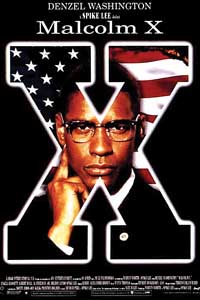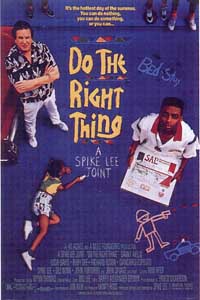A spike in controversy: Faculty to tackle difficult racial issues in Lee films
By Josh SchonwaldNews Office
 Spike Lee    |
Ever since his 1989 hit Do the Right the Thing, with its “fight-the-power” theme song and its setting amid the smoldering racial tensions of a Brooklyn pizza parlor, Spike Lee has been, arguably, one of America’s most consistently controversial filmmakers.
During Spring Quarter, movie fans will have a chance both to view and discuss many of Lee’s most important works.
Doc Films will screen a series of 10 of Lee’s films on Tuesdays at 7 p.m. through June 1. The films will be shown in the Max Palevsky Cinema in Ida Noyes Hall and will cost $4 per screening. Chicago faculty members will lead a discussion following the screening of each film.
The series, which began Tuesday with Joe’s Bed-Stuy Barbershop: We Cut Heads, Lee’s thesis film at New York University’s film school, resumes Tuesday, April 6, with the 1986 theatrical release She’s Gotta Have It. The film screenings in the remainder of the series are as follows:
Tuesday, April 13—School Daze—The story sets two wildly different cousins, played by Laurence Fishburne and Lee, at a historically black college. Damon Phillips, Associate Professor in the Graduate School of Business, will lead the post-screening discussion.
Tuesday, April 20—Do the Right Thing—Lee’s masterwork stars himself, Danny Aiello, Ossie Davis, John Turturro and Martin Lawrence.
Tuesday, April 27—Mo Better Blues—Denzel Washington stars as a trumpeter feuding with a saxophone player portrayed by actor Wesley Snipes in this 1990 film. Travis Jackson, Associate Professor in Music, will lead the post-screening discussion.
Tuesday, May 4—Jungle Fever—Wesley Snipes stars as an up-and-coming black architect whose affair with an Italian-American co-worker tears apart his seemingly picture-perfect family life.
Tuesday, May 11—Malcolm X—Lee’s 311-minute epic charts the personal and public life of Malcolm X, played by Denzel Washington.
Tuesday, May 18—Clockers—Lee presents a morally confused urban landscape, in which 19-year-old Strike, played by Mekhi Phifer, is taken under the wing of an influential drug lord. Jacqueline Stewart, Associate Professor in English Language & Literature, as well as in Cinema & Media Studies, will lead the post-screening conversation.
Tuesday, May 25—Get on the Bus—George, played by Charles Dutton, drives a busload of African-American men from Los Angeles to the Million Man March in Washington, D.C., including a Black Muslim, a Hollywood actor, a gay couple, and a father and son manacled together by court order. Cathy Cohen, Professor in Political Science and the College, and Director of the Center for the Study of Race, Politics and Culture, will lead the post-screening discussion.
Tuesday, June 1—Summer of Sam—In the sweltering New York City summer of 1977, King-of-the-Neighborhood Vinny, played by John Leguizamo, is losing control as he and wife fight over his womanizing ways. Danielle Allen, Professor in Classical Languages & Literatures and the College, will lead the post-screening conversation.
The film series is being held in conjunction with a class Stewart is teaching on Lee’s work. She previously taught Lee’s work in survey classes on the history of African-American film. Lee has directed a staggering 17 feature films since 1986, and has produced many more, including television documentaries. They have tackled a wide variety of racial issues, said Stewart, from class politics among African Americans, to the role that skin color differences play among African Americans, to interracial dating, to what it means to be black in corporate America. “It became increasingly hard to choose which of his films to teach because they all raise such interesting social and aesthetic questions,” Stewart said.
In addition to attending the screening at Doc each Tuesday, Stewart’s students also will be required to view a second Lee film each Sunday night. Because of the size of his oeuvre and the complicated racial themes he explores, Lee has become an increasingly popular subject in cinema studies. In fact, Stewart said, a recent panel discussion at a national conference of cinema scholars was titled “Teaching Spike Lee.”
The Lee film series is not the first time Stewart has collaborated with Doc Films.
During Winter Quarter 2002, Doc hosted a series of screenings of some of earliest films made by African-American directors. The screenings accompanied a graduate seminar Stewart was teaching.
That first series, Stewart said, attracted a huge turnout, with a surprisingly high attendance by residents of the communities surrounding campus. The diversity of participants was a key to the series’ success.
“It was tremendous,” said Stewart, “and one of the most interesting developments of that series was the intensity and unpredictability of the larger public’s response to these films.”
Stewart plans to discuss the community’s response to Lee’s films with her undergraduate students, and she fully expects that Lee’s films will provoke. After all, that is what Lee does.
“Lee,” said Stewart, “is constantly trying to push buttons. Whether or not you like Lee or his films, he has played an important role in creating dialogue about many of the thorny issues we face in contemporary American life.”
For more information about the film series, contact Doc Films’ 24-hour film line at (773) 702-8575.
![[Chronicle]](/images/sidebar_header_oct06.gif)